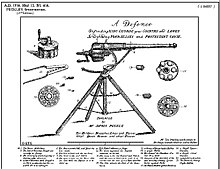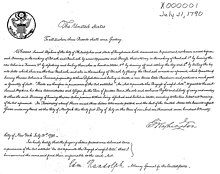History of patent law
| Patent law |
|---|
| Overviews |
| Procedural concepts |
| Patentability requirements and related concepts |
| Other legal requirements |
| By region / country |
| By specific subject matter |
| See also |
The history of patents and patent law is generally considered to have started with the
Early precedents
There is some evidence that some form of patent rights was recognized in Ancient Greece. In 500 BCE, in the Greek city of Sybaris (located in what is now southern Italy), "encouragement was held out to all who should discover any new refinement in luxury, the profits arising from which were secured to the inventor by patent for the space of a year."[2] Athenaeus, writing in the third century CE, cites Phylarchus in saying that in Sybaris exclusive rights were granted for one year to creators of unique culinary dishes.[3]
In England, grants in the form of
The first extant Italian patent was awarded by the
Development of the modern patent system
Patents were systematically granted in Venice as of 1450, where they issued a decree by which new and inventive devices had to be communicated to the Republic in order to obtain legal protection against potential infringers. The period of protection was 10 years.[10] These were mostly in the field of glass making. As Venetians emigrated, they sought similar patent protection in their new homes. This led to the diffusion of patent systems to other countries.[11]

King Henry II of France introduced the concept of publishing the description of an invention in a patent in 1555. The first patent "specification" was to inventor Abel Foullon for "Usaige & Description de l'holmetre", (a type of rangefinder.) Publication was delayed until after the patent expired in 1561.[11] Patents were granted by the monarchy and by other institutions like the "Maison du Roi" and the Parlement of Paris. The novelty of the invention was examined by the French Academy of Sciences.[12] Digests were published irregularly starting in 1729 with delays of up to 60 years. Examinations were generally done in secret with no requirement to publish a description of the invention. Actual use of the invention was deemed adequate disclosure to the public.[13]
The English patent system evolved from its early medieval origins into the first modern patent system that recognised intellectual property in order to stimulate invention; this was the crucial legal foundation upon which the Industrial Revolution could emerge and flourish.[14]
By the 16th century, the English Crown would habitually grant letters patent for monopolies to favoured persons (or people who were prepared to pay for them).[15] Blackstone (same reference) also explains how "letters patent" (Latin literae patentes, "letters that lie open") were so called because the seal hung from the foot of the document: they were addressed "To all to whom these presents shall come" and could be read without breaking the seal, as opposed to "letters close", addressed to a particular person who had to break the seal to read them.
This power was used to raise money for the Crown, and was widely abused, as the Crown granted patents in respect of all sorts of common goods (salt, for example). Consequently, the Court began to limit the circumstances in which they could be granted. After public outcry,
- ...the sole working or making of any manner of new manufactures within this realm to the true and first inventor and inventors of such manufactures which others at the time of making such letters patent and grants shall not use...
The Statute became the foundation for later developments in patent law in England and elsewhere.

Important developments in patent law emerged during the 18th century through a slow process of judicial interpretation of the law. During the reign of Queen Anne, patent applications were required to supply a complete specification of the principles of operation of the invention for public access.[16] Patenting medicines was particular popular in the mid-eighteenth century and then declined.[17] Legal battles around the 1796 patent taken out by James Watt for his steam engine, established the principles that patents could be issued for improvements of an already existing machine and that ideas or principles without specific practical application could also legally be patented.[18]
This legal system became the foundation for patent law in countries with a common law heritage, including the United States, New Zealand and Australia. In the Thirteen Colonies, inventors could obtain patents through petition to a given colony's legislature. In 1641, Samuel Winslow was granted the first patent in North America by the Massachusetts General Court for a new process for making salt.[19]
Towards the end of the 18th century, and influenced by the
Consolidation
The modern French patent system was created during the Revolution in 1791. Patents were granted without examination since inventor's right was considered as a natural one. Patent costs were very high (from 500 to 1500 francs). Importation patents protected new devices coming from foreign countries. The patent law was revised in 1844 - patent cost was lowered and importation patents were abolished. The revision saw the introduction of the Breveté SGDG, which excluded any guarantees that the patented item would actually satisfy its specification.

The
The first Patent Act of the U.S. Congress was passed on April 10, 1790, titled "An Act to promote the progress of useful Arts."[20] The first patent was granted on July 31, 1790 to Samuel Hopkins for a method of producing potash (potassium carbonate).
The earliest law required that a
The patent laws were again revised in 1836,[23] and the examination of patent applications was reinstituted.[24] In 1870 Congress passed a law which mainly reorganized and reenacted existing law, but also made some important changes, such as giving the commissioner of patents the authority to draft rules and regulations for the Patent Office.[25]
Criticism
Under the influence of the ascendant economic philosophy of free trade economics in England, the patent law began to be criticised in the 1850s as obstructing research and benefiting the few at the expense of public good.[26] The campaign against patenting expanded to target copyright too and, in the judgment of historian Adrian Johns, "remains to this day the strongest [campaign] ever undertaken against intellectual property", coming close to abolishing patents.[26]
Its most prominent activists - Isambard Kingdom Brunel, William Robert Grove, William Armstrong and Robert A. MacFie - were inventors and entrepreneurs, and it was also supported by radical laissez-faire economists (The Economist published anti-patent views), law scholars, scientists (who were concerned that patents were obstructing research) and manufacturers.[27] Johns summarizes some of their main arguments as follows:[28]
- [Patents] projected an artificial idol of the single inventor, radically denigrated the role of the intellectual commons, and blocked a path to this commons for other citizens — citizens who were all, on this account, potential inventors too. [...] Patentees were the equivalent of squatters on public land — or better, of uncouth market traders who planted their barrows in the middle of the highway and barred the way of the people.
Similar debates took place during that time in other European countries such as France, Prussia, Switzerland and the Netherlands.[29] Based on the criticism of patents as state-granted monopolies inconsistent with free trade, the Netherlands abolished patents in 1869 (having established them in 1817), and did not reintroduce them until 1912.[30] In Switzerland, criticism of patents delayed the introduction of patent laws until 1907.[29][30]
In England, despite much public debate, the system was not abolished - it was reformed with the Patent Law Amendment Act of 1852. This simplified procedure for obtaining patents, reduced fees and created one office for the entire United Kingdom, instead of different systems for England and Wales and Scotland. In France as well, a similar controversy erupted in the 1860s and reforms were made.[31]
There is also criticism regarding the prevalent gender gap in patents. Although historical laws that precluded women from obtaining patents are no longer in force, the number of women patent holders is still significantly disproportionate in comparison to their male counterparts.[32]
See also
- History of copyright law
- History of United States patent law
- United States patent case law
- Scire facias
Notes
- ISBN 3-7861-1748-9
- ^ Charles Anthon, A Classical Dictionary: Containing An Account of the Principal Proper Names Mentioned in Ancient Authors, And Intended To Elucidate All The Important Points Connected With The Geography, History, Biography, Mythology, And Fine Arts Of The Greeks And Romans Together With An Account Of Coins, Weights, And Measures, With Tabular Values Of The Same, Harper & Bros, 1841, page 1273.
- ^ Phylarchus of Naucratis, "The Deipnosophists, or, Banquet of the Learned of Athenæus", Translated from Ancient Greek by H.Bohn 12:20, p.835
- ^ Terrell on Patents, 8th edition edited by J R Jones, London (Sweet & Maxwell) 1934.
- ^ a b E Wyndham Hulme, The History of the Patent System under the Prerogative and at Common Law, Law Quarterly Review, vol.46 (1896), pp.141-154.
- ^ Ted Sichelman & Sean O’Connor, Patents as Promoters of Competition: The Guild Origins of Patent Law in the Venetian Republic, 49 San Diego L. ReV. 1267 (2012).
- ^ Terence Kealey, The Economic Laws of Scientific Research, St. Martin's Press, 1996
- ISBN 0-7355-1499-2, page 3.
- ISBN 978-0-521-89399-2, page 11.
- ^ "Wolfgang-Pfaller.de: Patentgesetz von Venedig" (in German and Italian).
- ^ a b M. Frumkin, "The Origin of Patents", Journal of the Patent Office Society, March 1945, Vol. XXVII, No. 3, pp 143 et Seq.
- ^ Nowotarski, Bakos, “A Short History of Private Patent Examination”, Insurance IP Bulletin Oct. 2009
- ^ Frank D. Prager, “Proposals for the Patent Act of 1790", Journal of the Patent and Trademark Office Society, March 1954, vol XXXVI, No. 3, pp 157 et Seq., citing J. Isore in Revue Historique de Droit Francais, 1937 pp. 117 et Seq.
- ISBN 9780521893992
- ^ "Blackstone's Commentaries". Retrieved 2008-02-24.
THE king's grants are alſo matter of public record. For, as St. Germyn ſays, the king's excellency is ſo high in the law, that no freehold may be given to the king, nor derived from him, but by matter of record. And to this end a variety of offices are erected, communicating in a regular ſubordination one with another, through which all the king's grants muſt paſs, and be tranſcribed, and enrolled; that the ſame may by narrowly inſpected by his officers, who will inform him if any thing contained therein is improper, or unlawful to be granted. Theſe grants, whether of lands, honours, liberties, franchiſes, or ought beſides, are contained in charters, or letters patent, that is, open letters, literae patentes: ſo called becauſe they are not ſealed up, but expoſed to open view, with the great ſeal pendant at the bottom; and are uſually directed or addreſſed by the king to all his ſubjects at large. And therein they differ from certain other letters of the king, ſealed alſo with his great ſeal, but directed to particular perſons, and for particular purpoſes: which therefore, not being proper for public inſpection, are cloſed up and ſealed on the outſide, and are thereupon called writs cloſe, literae clauſae; and are recorded in the cloſe-rolls, in the ſame manner as the others are in the patent-rolls...
- ^ "The 18th century". Intellectual Property Office. Archived from the original on 2014-04-22. Retrieved 2010-06-14.
- ^ Alan Mackintosh, Authority and Ownership: the growth and wilting of medicine patenting in Georgian England, British Journal for the History of Science 2016, DOI: https://doi.org/10.1017/S0007087416001114
- UK Intellectual Property Office. 2006. Archived from the originalon 2007-09-29. Retrieved 2007-08-12.
- ISBN 978-0-7506-7058-6.
- ^ Online at Library of Congress: "A Century of Lawmaking for a New Nation: U.S. Congressional Documents and Debates, 1774 - 1875": First Congress, Session II, chapter VII, 1790: "An Act to promote the progress of useful Arts".
- ^ Chap. XI. 1 Stat. 318 from A Century of Lawmaking for a New Nation: U.S. Congressional Documents and Debates, 1774 - 1875". Library of Congress, Law Library of Congress. Retrieved Sept. 4, 2009.
- )
- ^ Chap. CCCLVII. 5 Stat. 117 from "A Century of Lawmaking for a New Nation: U.S. Congressional Documents and Debates, 1774 -1875". Library of Congress, Law Library of Congress. Retrieved Oct. 19, 2009.
- ^ "National Portrait Gallery Building Chronology". Archived from the original on 2007-04-25. Retrieved 2007-04-27.
- ^ Chap.CCXXX. 16 Stat. 198 from "A Century of Lawmaking for a New Nation: U.S. Congressional Documents and Debates, 1774 - 1875". Library of Congress, Law Library of Congress. Retrieved Oct. 19, 2009.
- ^ ISBN 978-0-226-40118-8, p.247
- ^ Johns, Adrian: Piracy, p. 249, 267, 270
- The Jurist n.s. 6 (January 28, 1860) 19-25 (online copyat Google Books), and B. Sherman, L. Bently: The Making of Modern Intellectual Property Law (CUP 1999), 50-56
- ^ a b Johns, Adrian: Piracy, p. 248
- ^ Post-Autistic Economics Review. 4 September 2002: Issue 15, Article 3. Retrieved on 8 October 2008.
- ISBN 978-2-7535-0695-4.
- S2CID 154441953– via JSTOR.
References
- Kenneth W. Dobyns, The Patent Office Pony; A History of the Early Patent Office, Sergeant Kirkland's Press 1994. [1]
- Howard B. Rockman, Intellectual Property law for Engineers and Scientists.
- Bugbee, Bruce W. Genesis of American Patent and Copyright Law. Washington, D.C.: Public Affairs Press (1967).
- Christine MacLeod, Inventing the Industrial Revolution: The English patent system, 1660–1800, Cambridge University Press.
- Galvez-Behar, G. La République des inventeurs. Propriété et organisation de l'innovation en France, Presses universitaires de Rennes, 2008.
External links
- First patents
American
- X Series : U.S. patent X000001 "Improvements in making pot ash and pearle ash"
- 1st Numerical : U.S. patent 0,000,001 "Traction Wheel"
- 1st Design : U.S. patent D000001 Script font type
- 1st Reissued : U.S. patent RE00001 "Grain Drill"
- Websites

